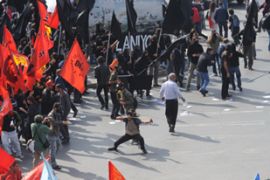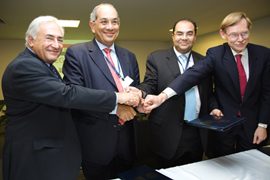Turkish police break up protests
Tear gas and water cannons used for second day of World Bank-IMF meeting in Istanbul.

Similar scenes were witnessed on Tuesday when the meetings began. Police used water cannons and tear gas to as protesters smashed windows of a McDonald’s fast food restaurant and several banks in Istanbul.
An estimated 13,000 people are attending the two-day even featuring finance ministers, central bankers and academics from the member states.
Quoting trade union officials, Al Jazeera’s Anita McNaught in Istanbul said: “IMF and World Bank policies mean hunger, poverty and unemployment for ordinary Turks.
“Everyone here knows that there is a huge immediate and future cost in allowing unemployment figures to remain high.
“Many protesters feel that they [IMF and World Bank] have kept Turkey looking stable – with fiscal track records acceptable to foreign investors and foreign governments – but the price the people of Turkey have paid has been far too high.”
Recovery role
Governments and big business are looking to the two 186-member financial institutions to help bolster a tentative recovery and mitigate the painful social effects that the economic crisis is having.
 |
| IMF and World Bank policies have been blamed for unemployment among Turks [AFP] |
Reflecting economic fears, finance chiefs have sounded a cautious note.
Robert Zoellick, the World Bank president, said: “There are many risks out there. These include growing unemployment lines, rising protectionism and still-large output gaps.
“The global economy could still suffer a setback, not least in 2010 when governments plan to withdraw much of their economic stimulus and debt rollovers could be combined with a rise in interest rates.”
Dominique Strauss-Kahn, the IMF chief, sounded a similar note.
“There is no way to say the crisis is over when we still have this big rise in unemployment in front of us,” he said.
Opinion divided
Many Turks living in Istanbul have not welcomed IMF and World Bank officials to their capital.
But expert opinion is divided.
Hayri Kozanoglu, an economics professor at Marmara University, told Al Jazeera: “For them [IMF and World Bank], after the development of a country, the improvement of the living standards of its people is not so important.
“What is important is that a country can pay back its foregin debt and it can shape its economy in a neo-liberal way.”
The IMF and World Bank are also looking beyond the crisis at ways of managing a global economic system in a way that will make it less prone to downturns and at a world where US consumer spending will no longer play such a dominant role.
World leaders of the Group of 20 (G20) major developed and emerging economies last month entrusted the IMF with monitoring economic and financial stability around the world in order to help spot problems early.
Developing nations are also to be given greater voting rights in both the IMF and World Bank under complex reforms that are still being thrashed out as emerging economies such as Brazil, China and India lobby for a bigger role.